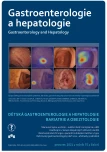-
Medical journals
- Career
Effect of ursodeoxycholic acid in postcholecystectomy cholestatic hepatopathy verified by ultrasonography
Authors: Demková K. 1; Jr Varga T. 2; Tokarčík J. 1; Rudnay M. 3; Šafčák D. 4
Authors‘ workplace: IV. interná klinika LF UPJŠ a UNLP Košice 1; INTERNÉ – MUDr. VARGOVÁ T., s. r. o., Kráľovský Chlmec 2; Oddelenie rádiodiagnostiky a zobrazovacích metód LF UPJŠ a UNLP Košice 3; Klinika rádioterapie a onkológie LF UPJŠ a VOÚ, a. s., Košice 4
Published in: Gastroent Hepatol 2021; 75(6): 545-549
Category: Hepatology: case report
doi: https://doi.org/10.48095/ccgh2021545Overview
Cholestasis syndrome is accompanied by a large number of diverse liver and biliary tract diseases. Many cholestatic changes are fully reversible in the first phase. However, with long-term cholestasis, extensive hepatocyte dysfunction occurs, the disease progresses, and many cholestatic syndromes result in irreversible liver damage and failure. Cholestatic liver diseases represent an important group of liver diseases that are an indication for liver transplantation. Postcholecystectomy syndrome is an imprecisely defined term, which includes a set of ongoing or recurrent or new difficulties of patients after gallbladder surgery. We distinguish between early postcholecystectomy syndrome immediately in the postoperative period, or late postcholecystectomy syndrome, which occurs months or even years later. Ultrasonography is the first imaging examination method for diseases of the liver and hepatobiliary system. It is a non-invasive method, available, relatively cheap, easily repeatable, and it does not represent a burden for the patient. Common bile duct dilatation after cholecystectomy is a common accidental finding that is inconclusive in the absence of clinical symptomatology and with normal laboratory findings. Ursodeoxycholic acid forms the basis of cholestasis therapy, the only treatment whose efficacy in cholestatic liver disease has been demonstrated in randomized and long-term studies. A further positive is that many years of ursodeoxycholic acid administration are not accompanied by more serious side effects. This case report supports the concept of a prompt and at the same time deepening beneficial effect of ursodeoxycholic acid treatment in patients with cholestatic hepatopathy verified by ultrasonography indicated for conservative treatment or refusing invasive treatment.
Keywords:
ultrasonography – cholestasis – postcholecystectomy syndrome – ursodeoxycholic acid
Sources
1. Hůlek P, Urbánek P et al. Hepatologie. 3. vyd. Praha: Grada Publishing 2018.
2. Lukáš K et al. Gastroenterologie a hepatologie pro zdravotní sestry. 1. vyd. Praha: Grada Publishing 2005.
3. Klener P et al. Vnitřní lékařství. 4. vyd. Praha: Galén 2011.
4. Hrušovský Š. Praktická hepatológia. 3. vyd. Bratislava: HERBA 2015.
5. Češka R et al. Interna. 3. vyd. Praha: Triton 2020.
6. Yu MH, Kim YJ, Park HS et al. Benign gallbladder diseases: imaging techniques and tips for differentiating with malignant gallbladder diseases. World J Gastroenterol 2020; 26 (22): 2967–2986. doi: 10.3748/wjg.v26.i22. 2967.
7. Bo X, Chen E, Wang J et al. Diagnostic accuracy of imaging modalities in differentiating xanthogranulomatous cholecystitis from gallbladder cancer. Ann Transl Med 2019; 7 (22): 627. doi: 10.21037/atm.2019.11.35.
8. Horák J, Ehrmann J. Hepatologie do kapsy. 1. vyd. Praha: Mladá fronta 2014.
9. Ratanaprasatporn L, Uyeda JW, Wortman JR et al. Multimodality imaging, including dual-energy CT, in the evaluation of gallbladder disease. Radiographics 2018; 38 (1): 75–89. doi: 10.1148/rg.2018170076.
10. Catalano OA, Sahani DV, Kalva SP et al. MR imaging of the gallbladder: a pictorial essay. Radiographics 2008; 28 (1): 135–155. doi: 10.1148/rg.281065183.
11. Niehaus J. Sonografie praktická příručka. 1. vyd. Praha: Grada Publishing 2020.
12. Križanová M et al. Farmakológia. Martin: Osveta 2005.
13. Juřica J. Ursodeoxycholová kyselina. Gastroent Hepatol 2016; 70 (5): 457–462. doi: 10.14735/amgh2016457.
14. Marek J et al. Farmakoterapie vnitřních nemocí. 4. vyd. Praha: Grada Publishing 2010.
Labels
Paediatric gastroenterology Gastroenterology and hepatology Surgery
Article was published inGastroenterology and Hepatology

2021 Issue 6-
All articles in this issue
- Paediatric gastroenterology and hepatology
- Léčba obezity – aby se bariatricko-metabolická chirurgie nestala obětí vlastního úspěchu
- Azathioprine in the therapy of paediatric inflammatory bowel disease – part I: treatment indications, dosing and thiopurine-related adverse events
- Azathioprine in the therapy of paediatric inflammatory bowel disease – part II: pharmacodynamics, pharmacokinetics, and the possibilities of measuring its metabolites in clinical practice
- Gluten-related immunogenic peptides in stool as means to monitor compliance with gluten-free diet in children with newly diagnosed coeliac disease
- The role of bariatric surgery in patients with type 1 diabetes mellitus
- Diet after bariatric surgery in practice
- Spontaneous intramural duodenal hematoma in a young woman
- Assistance system for real-time polyp detection based on convolutional neural network
- Effect of ursodeoxycholic acid in postcholecystectomy cholestatic hepatopathy verified by ultrasonography
- Biosimilars monoclonal antibodies in the therapy of inflammatory bowel diseases An important milestone in the development of Crohn’s disease and ulcerative colitis therapy, or just a sophisticated generic?
- The selection from international journals
- Idiopatické střevní záněty. Nové trendy a mezioborové souvislosti
- Idiopatické střevní záněty II. Nové trendy a mezioborové souvislosti
- Gastroenterologie a hepatologie v algoritmech
- Prof. MUDr. Petr Dítě, DrSc., slaví 80 let
- Správná odpověď na předchozí kvíz Gastrointestinální stromální tumor
- Kreditovaný autodidaktický test: dětská gastroenterologie a hepatologie / bariatrie a obezitologie
- Janus kinase inhibitor in modern treatment of ulcerative colitis
- Smoking and oncology – offering smokers a scientifically based, less harmful alternative is ethical
- Ružinovský gastroenterologický deň 2021 5. november 2021
- The indications for performing colonoscopy in Iranian children – a cross-sectional study
- Gastroenterology and Hepatology
- Journal archive
- Current issue
- Online only
- About the journal
Most read in this issue- Azathioprine in the therapy of paediatric inflammatory bowel disease – part I: treatment indications, dosing and thiopurine-related adverse events
- Diet after bariatric surgery in practice
- Gluten-related immunogenic peptides in stool as means to monitor compliance with gluten-free diet in children with newly diagnosed coeliac disease
- Prof. MUDr. Petr Dítě, DrSc., slaví 80 let
Login#ADS_BOTTOM_SCRIPTS#Forgotten passwordEnter the email address that you registered with. We will send you instructions on how to set a new password.
- Career

